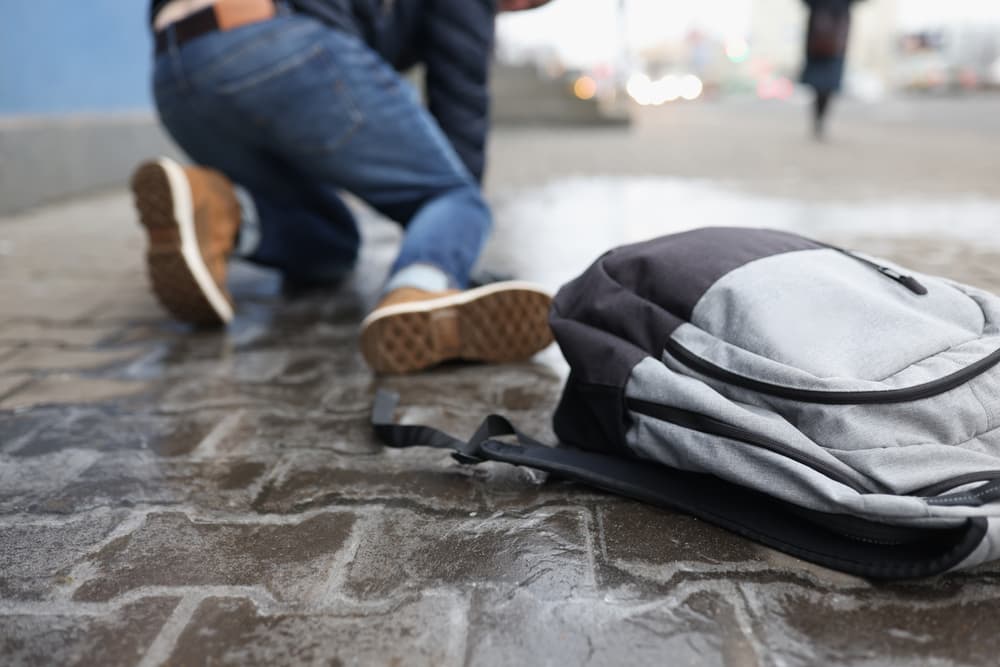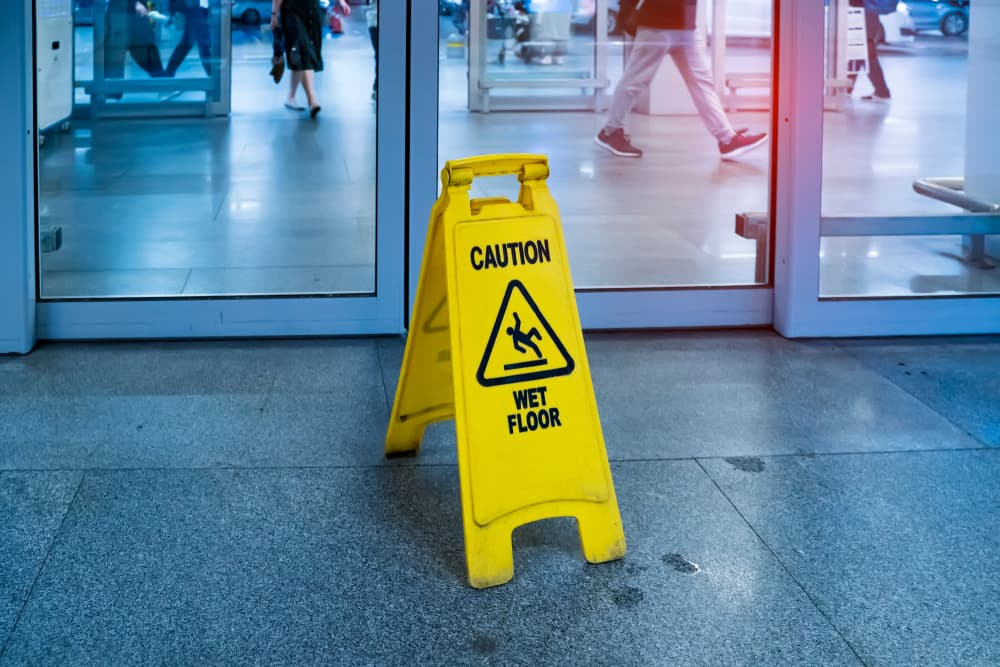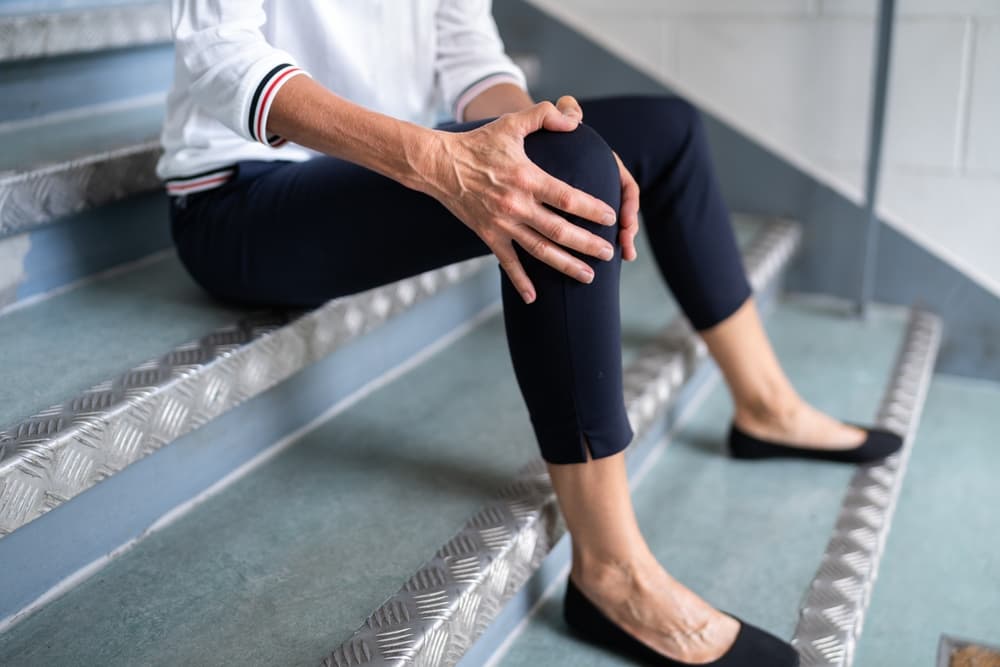Slip and fall accidents can happen anywhere—at the grocery store, in a shopping mall, or even at a friend's house.
These types of accidents can result in serious injuries, ranging from sprains and fractures to traumatic brain injuries. If a slip and fall incident injured you, a slip and fall lawyer can explain your legal rights and the laws that apply in Florida.
In this comprehensive guide, we'll explore the key aspects of slip and fall laws in Florida, including premises liability, the elements of a successful claim, common causes and injuries, and the steps you should take to protect your rights.
Schedule A Consultation Today!
Understanding Premises Liability in Florida
Premises liability is the legal principle that holds property owners responsible for injuries that occur on their property.
In Florida, property owners have a duty of care to make their premises safe for visitors and guests. This means they must take reasonable steps to identify and address any hazards that could lead to a slip and fall accident.
If a property owner fails to uphold this duty of care, and a visitor is injured as a result, they can hold the property owner liable for the victim's damages. This includes medical expenses, lost wages, and pain and suffering.

Elements of a Slip and Fall Case
To successfully bring a slip and fall claim in Florida, you must prove the following elements:
- Duty of Care: The property owner owed you a duty of care to keep the premises safe.
- Breach of Duty: The property owner failed to fulfill this duty by allowing a hazardous condition to exist.
- Causation: The hazardous condition directly caused your slip and fall accident and resulting injuries.
- Damages: As a result of the accident, you suffered measurable damages, such as medical expenses or lost wages.
Proving these elements can be complex, so work with an experienced slip and fall attorney in Florida.
Common Causes of Slip and Fall Accidents
Slip and fall accidents can occur for a variety of reasons, but some of the most common causes include:
- Wet or slippery floors
- Uneven or cracked pavement
- Poorly lit areas
- Loose or torn carpeting
- Cluttered or obstructed walkways
- Broken or missing handrails
- Inadequate warning signs or caution markers
Property owners must promptly address these and other hazards to prevent slip and fall incidents.
Common Slip and Fall Injuries
Slip and fall accidents can result in many injuries, some of which can be quite serious. Some of the most common slip and fall injuries include:
- Sprains and strains
- Fractures, especially in the wrists, ankles, and hips
- Traumatic brain injuries
- Spinal cord injuries
- Soft tissue injuries, such as bruises and lacerations
The severity of your injuries will depend on the circumstances of your accident, your age and overall health, and the impact force. Seeking prompt medical attention is crucial, not only for your health but also to document your injuries for a potential legal claim.
Duty of Care in Slip and Fall Cases
As mentioned earlier, property owners in Florida have a duty of care to ensure the safety of their premises. This duty extends to all visitors, including customers, guests, and sometimes even trespassers.
The specific level of care required depends on the type of visitor. For example, property owners owe the highest duty of care to invitees, such as customers in a retail store. They must regularly inspect the premises, identify and address any hazards, and provide adequate warning of any known dangers.
The duty of care owed to licensees, such as social guests, is slightly lower, but property owners still must warn of known hazards. Trespassers, on the other hand, receive the lowest duty of care, but property owners must still refrain from intentionally harming them.
Proving Negligence in a Slip and Fall Case

To prevail in a slip and fall case, you must demonstrate that the property owner's negligence was the primary cause of your accident.
This means showing that the owner knew or should have known about the hazardous condition that led to your fall, and failed to take reasonable steps to address it.
Some common ways to prove negligence in a slip and fall case include:
- Presenting evidence of the hazardous condition, such as photos or witness statements
- Showing that the property owner had actual or constructive knowledge of the hazard (i.e., the condition existed for a long enough period that the owner should have discovered and fixed it)
- Demonstrating that the property owner failed to implement adequate safety measures, such as warning signs or regular inspections
- Proving that the property owner created the hazardous condition through their own actions or inactions
Gathering this evidence can be challenging, so work with a skilled slip and fall attorney in Florida.
What is Comparative Fault?
Florida follows a comparative fault system when it comes to slip and fall cases. If you partially caused your accident, your damages may decrease.
This is an important consideration, as it can significantly diminish the compensation you receive. Work with a good lawyer to protect you from accusations of responsibility for your accident.
Statute of Limitations for Slip and Fall Claims in Florida
In Florida, the statute of limitations for slip and fall claims gives you two years to file a lawsuit against the property owner for your injuries and damages.
Courts strictly enforce this deadline, so act quickly if you plan to pursue a slip and fall claim. Failing to file within the two-year window may result in the court dismissing your case, regardless of the merits.
Steps to Take after a Slip and Fall Accident
After a slip and fall accident, to protect your rights and maximize your chances of a successful claim:
- Seek immediate medical attention, even if your injuries don't seem severe. This will create a record of your injuries and their cause.
- Report the accident to the property owner or manager and obtain a copy of the incident report.
- Take photographs of the hazardous condition that caused your fall, as well as your injuries.
- Collect the names and contact information of any witnesses who saw the accident occur.
- Avoid making any statements to the property owner's insurance company or representatives until you consult an attorney.
- Contact a skilled slip and fall attorney in Florida to discuss your case and explore your legal options.
Compensation Available in Slip and Fall Cases
If you successfully prove that the property owner's negligence caused your slip and fall accident, you may recover compensation for:
- Medical expenses, both past and future
- Lost wages and diminished earning capacity
- Pain and suffering
- Emotional distress
- Permanent disability or disfigurement
The compensation you receive will depend on the severity of your injuries, the impact on your life, and the strength of your legal case.
Hiring a Slip and Fall Attorney in Florida
Navigating the complexities of a slip and fall case in Florida can be challenging, so work with an experienced personal injury attorney.
A skilled slip and fall lawyer can help you:
- Investigate the accident and gather evidence to support your claim
- Determine the appropriate parties to hold responsible
- Negotiate with insurance companies and property owners on your behalf
- Ensure that you receive the maximum compensation available for your injuries and damages
- Represent you in court if a settlement cannot be reached
When choosing a slip and fall attorney, look for one with a proven track record of success in these types of cases and a deep understanding of Florida's slip and fall laws.
How the Defense Will Attempt to Fight Your Claim
When you file a slip and fall claim, the property owner or their insurance company may defend against your case.
Here are some common tactics they may use:
- Denying Liability: The defense may argue that the property owner had no knowledge of the hazardous condition that led to your accident, or that they had taken reasonable steps to address the issue.
- Claiming Comparative Negligence: The defense may try to shift the blame by arguing that you were partially responsible for the accident due to your own actions or failure to exercise reasonable care.
- Questioning the Severity of Injuries: The defense may challenge the extent or nature of your injuries, claiming that they are not directly related to the slip and fall incident.
- Disputing Causation: The defense may attempt to argue that your injuries were caused by a pre-existing condition or some other factor unrelated to the slip and fall.
- Statute of Limitations: If you fail to file your claim within the allotted time frame, the defense may use the statute of limitations to dismiss your case.
Understanding these potential defenses can help you and your attorney develop a strong legal strategy to counter the property owner's arguments and increase your chances of a successful outcome.
Evidence You'll Need to Prove Your Claim
Building a strong case for a slip and fall claim in Florida requires gathering evidence.
The key information you'll need to collect includes:
- Photographic Evidence: Take clear, well-lit photos of the hazardous condition that caused your accident, as well as any injuries you sustained.
- Witness Statements: Obtain written statements from anyone who witnessed the incident, as their testimony can support your claim.
- Incident Reports: Request copies of any incident reports filed by the property owner or management, as these can document the event.
- Medical Records: Compile a comprehensive record of your medical treatment, including doctor's notes, diagnostic test results, and any ongoing rehabilitation or therapy.
- Proof of Lost Wages: If your injuries have resulted in missed work or lost income, gather documentation such as pay stubs, timesheets, and letters from your employer.
You must organize and present this evidence in a clear and compelling manner for your slip and fall case to succeed.
10 Reasons Why You Need a Lawyer
To navigate the complexities of a slip and fall case in Florida, seek the guidance of an experienced personal injury attorney.

Here are 10 reasons why you need a lawyer for your slip and fall claim:
- Experience in Premises Liability Laws: Experienced slip and fall lawyers have a deep understanding of the applicable laws and regulations, which can be crucial in building a strong case.
- Negotiation Skills: Attorneys can effectively negotiate with insurance companies and opposing counsel to secure a fair settlement on your behalf.
- Thorough Investigation: Lawyers have the resources and tools to comprehensively investigate the incident, gathering the necessary evidence to support your claim.
- Calculating Damages: Lawyers can accurately determine the full extent of your damages, including medical bills, lost wages, and pain and suffering, to ensure you receive the compensation you deserve.
- Handling Paperwork: The legal process involves a significant amount of paperwork, which can be overwhelming for an individual. Lawyers can handle all the necessary documentation and filings on your behalf.
- Navigating the Legal System: Attorneys are well-versed in the complexities of the legal system, allowing them to guide you through the process and ensure your rights are protected.
- Objectivity and Impartiality: Lawyers can provide an objective, impartial perspective on your case, helping you make informed decisions.
- Courtroom Representation: If your case goes to trial, a skilled lawyer can effectively represent you in court and advocate for your interests.
- Contingency Fees: Many personal injury attorneys work on a contingency fee basis, meaning you only pay if they win your case, making their services accessible to a wider range of clients.
- Increased Chances of Success: Studies have shown that individuals who hire a lawyer for their slip and fall cases are more likely to receive a favorable outcome, whether through a settlement or a court judgment.
Consult Our Legal Team Today
If a slip and fall accident in Florida injured you or a loved one, don't hesitate to contact our experienced personal injury lawyers at Lulich & Attorneys for a consultation.
We'll review the details of your case, advise you on your legal options, and fight to ensure you receive the compensation you deserve.
